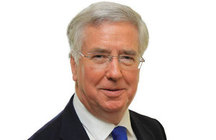Michael Fallon – 2017 Speech at Faslane
Below is the text of the speech made by Michael Fallon, the Secretary of State for Defence, on 29 September 2017.
It is a huge pleasure to welcome Permanent and Military Representatives of NATO to Her Majesty’s Naval Base Clyde.
Our nation’s commitment to the Alliance – the bedrock of our defence – remains absolute.
In the past year alone we’ve increased our NATO efforts: policing Black Sea skies, leading half of its maritime missions and upping our efforts to mentor Afghan officers. And today, our Prime Minister is in Estonia visiting the 800 UK troops who, supported by our French and Danish allies, are leading NATO’s Enhanced Forward Presence providing vital reassurance to our Eastern European allies.
But there’s no greater illustration of our commitment to NATO which, after all, remains a nuclear alliance than our investment in the UK’s independent nuclear deterrent submarine force. And today, we mark the milestone of its 350th patrol at its home base.
So, before I continue, I would like to thank our brave submariners and our submarine enterprise as a whole. For almost 50 years their efforts and those of their forebears have kept us safe every hour of every day. They remain the ultimate guarantors of our security.
And this event offers us a unique opportunity to remind ourselves why our nuclear programme remains so significant.
Protect Our People
First, it’s about protecting our people. Our nuclear deterrent remains our only defence against the most extreme threats to our way of life.
Those threats are intensifying whether they come from North Korea’s latest nuclear testing setting off a hydrogen bomb, launching ballistic missiles and reinforcing her reckless defiance of the international community. Or Russia, which not content with aggression in Ukraine and Crimea, has over the last few years repeatedly ramped up its nuclear rhetoric and in its latest exercise involving some 50,000 troops massed on the borders of Eastern Europe will also test nuclear capable ballistic missiles.
Now the UK remains firmly committed to the long term goal of a world without nuclear weapons. As Secretary of State, I reduced the number of deployed warheads on each submarine from 48 to 40 and the number of operationally available warheads to no more than 120. Just as we remain committed to reducing our overall stockpile of nuclear warheads to no more than 180 by the mid-2020s.
Yet, at the same time, we remain realistic. The total number of nuclear weapons in the world did not suddenly fall. Much as we would love to live in a world without nuclear weapons. We cannot uninvent them.
Our deterrent ensures our adversaries are left in no doubt that the benefits of any attack will be vastly outweighed by the consequences.
No credible alternative exists. And we see no reason to change our posture.
Protect Our Alliance But this brings me back to the point at which I started. Our nuclear deterrent isn’t just essential for our security. it’s essential for NATO’s security as well. It forms one of the Alliance’s key centres of decision making that complicates the calculations of our adversaries.
What is more, many nations, represented here today signed the Non-Proliferation Treaty (NPT) in the late 1960s, safe in the knowledge they were covered by NATO’s nuclear umbrella including the United Kingdom deterrent. Not only did that deal help halt the nuclear arms race at the time, it has helped to cut the world’s nuclear stockpile by 85%.
It is no coincidence there hasn’t been a major conflict involving nuclear powered states since the end of the Second World War.
Protect Our Future
Finally, our independent deterrent is a promise to protect our future. We don’t know what threats lie around the corner.
Yet by giving the next generation every means necessary – from the conventional though to the nuclear – to deal with whatever comes round the corner.
We are strengthening their hand ensuring that they will have the means to deter potential threats into the 2040s, 2050s, 2060s and beyond.
That is why today we’re building four Dreadnought class submarines which will enter service in the early 2030’s.
That is why we’re continuing to spend £1.3 billion over the next three years on facilities here at Faslane. And that is why we are building on the incredible advanced manufacturing skills found across Scotland to transform this base into a Royal Navy submarine centre of specialisation a base for all UK submarines providing 6,800 jobs now and 8,200 in the future.
Conclusion
So I hope you find your visit instructive and informative.
You can rely on the UK to remain not just 100 per cent committed to our NATO alliance but 100 per cent committed to our deterrent – a message Parliament confirmed overwhelmingly last year when it voted to maintain CASD. At the same time, we can never be complacent.
As we look towards next year’s NATO summit and beyond we must not just ensure the Alliance’s political and military leaders continue recognising the importance of nuclear capabilities as NATO adapts and modernise but continues to make the case about the importance of nuclear weapons to a new generation.
Our national safety the strength of our Alliance and the security of the world depends on it.

